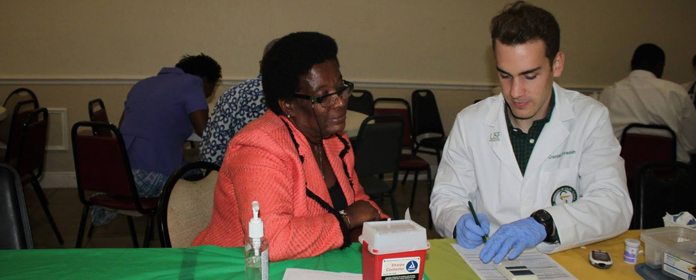"What I would highlight most about my stay at the University of South Florida is the opportunity to experience the reality of our profession".
For 4 months Daniel Fresán (4th year of Pharmacy) has been student of USF and has collaborated in a clinic for people with few resources.

PHOTO: Courtesy
Daniel Fresán (4th year of Pharmacy) has just finished his four-month stay at the University of South Florida with the International Observer Program, promoted by the School of Pharmacy and Nutrition. This experience has helped him to take several courses in the American campus , collaborate with a group of students in a clinic for people without resources and even participate in congresses.
- How did you manage your stay in Florida and how many months are you going to spend there?
I have had the opportunity to study at the University of South Florida (USF) thanks to the agreement that this center maintains with the School of Pharmacy and Nutrition of the University of Navarra. The program, called"International Observer Program", lasts 4 months -from the end of July to the middle of November-, but since we don't start the supervised stays until January, all the students who have come during the four years of the program have taken advantage of the month of December to travel.
- What has your work consisted of during your stay?
The experience has been very positive in general. Here I combine the three subjects I am taking at the University with the care in a clinic (BRIDGE clinic) run by students from different disciplines, such as medicine, work social and physiotherapy, for people without resources who cannot afford health insurance. Since there is a large Hispanic population, in addition to providing pharmaceutical knowledge, I help with interpretation. In addition, I have been given the opportunity to participate in congresses and health fairs, something very enriching that is helping me to fill in my training as a pharmacist.
- What is your stay giving you so far and what do you think is the most positive thing about this training?
This stay is giving me a plus of knowledge. For example, one of the subjects, Pharmaceutical Skillsis totally internship and helps us to learn how to deal with patients, how to advise them on the correct use of a glucometer or an inhaler, among other things. This, which may seem silly, is very useful. Also, dealing with real patients at BRIDGE Clinic makes you realize what your profession is really about. With this experience, you go from theory to internship. This possibility to live the reality of our profession is what I would highlight the most about my experience in the USA.
- Why would you encourage a pharmacy student to live an experience like yours?
In my opinion, a exchange should be a mandatory experience. Besides, I think that in my case I could not have chosen a better place.
Spending time abroad will help you financial aid to mature and fill in your training; to improve your English; it gives you different, complementary knowledge; and it allows you to meet and get to know people from other cultures.
- What are the main differences between the perception of the pharmaceutical profession in Spain and the U.S.?
The main difference is the image that society has of the pharmacist. Here, unlike in Spain, the pharmacist is not seen as a medicine salesman, but his role has a great value. Both the pharmaceutical indication in relation to medicines and lifestyle, as well as the pharmacotherapeutic follow-up are highly appreciated. In fact, in the U.S. Pharmacy is a doctoral program.
In the hospital this is reflected in the fact that the pharmacist spends enquiry as well as the doctors. In addition, the pharmacist can vaccinate, among other tasks that we do not do in Spain.
- Within medical teams, what role do pharmacists play?
In the United States, the pharmacist is highly integrated within the team of healthcare professionals. They work in coordination with other disciplines to achieve the maximum possible benefit for the patient. In Spain this integration is just beginning to materialize in hospital teams.
In the U.S., for example, the physician relies heavily on the pharmacist when prescribing, and even delegates this function completely. The pharmacist can make changes in doses, and so on. In reality, this is the role for which we are qualified, but in Spain we are a long way from applying it.
